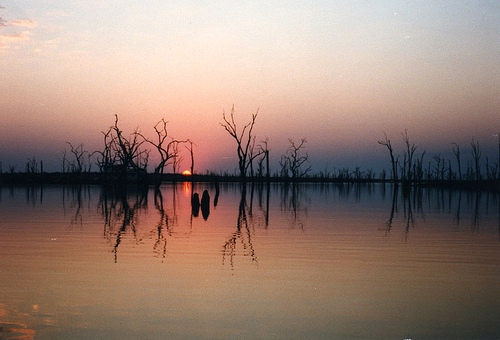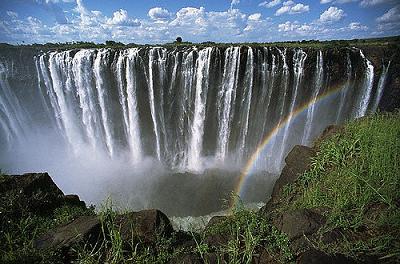The post Pedaling Around Expat Expectations in Zimbabwe appeared first on The Expeditioner Travel Site.
]]>
Vehicles with drivers seeking an early start to the weekend jammed the intersection. I gingerly approached the mayhem, weaved through traffic and took a sharp, two-wheeled left onto the sidewalk. I left the bottleneck behind; however, I still can’t steer clear of criticism for not owning a car in Zimbabwe, an apparent affront to the social order.
After accepting my first teaching assignment in Africa in 2016, I received an email from the school, outlining some of the necessities: lightweight clothing, generous amounts of sunscreen and above all, a car, preferably an air-conditioned SUV.
I wasn’t surprised a vehicle topped the list because I was moving to Harare, a metropolitan city of 1.6 million people with a five-month rainy season. I understood why parents with children might require a car, but as a bachelor, I didn’t consider it essential. I wouldn’t conform. I’d buy a bicycle instead.
My rationale was simple. With the unemployment rate in Zimbabwe hovering around 90 percent, it’s safe to say most people don’t own a car or ever will. The public transportation system — consisting mainly of mini-vans — is overcrowded, unreliable and some say, unsafe, but it exists. Bicycles are readily available and of course, there’s always walking. If everyone else managed, I could too.
Using a bicycle as my sole mode of transportation has proven to be easier than I imagined. My commute takes 10 minutes. A trip to the nearest grocery store is just down the block, a chore facilitated by a rack enabling me to haul all my purchases. I’m able to hit most of the social spots, although I do rely on friends for lifts to distant destinations.
Considering the country’s long history of fuel shortages, I anticipated praise as I peddled down the road less traveled on my zero-emissions vehicle but it’s been quite the opposite.
“What will you do during the rainy season?”
My customary response: “Get wet.”
Riding through downpours isn’t my idea of paradise but nylon rain gear keeps me mostly dry, an option economically inaccessible for a lot of African cyclists.
“You won’t be able to see many places in Zimbabwe without driving a car.”
True, I lose the ability to drive to any game reserve I want, when I want, but there are buses — even luxury buses — crisscrossing the country, and friends have invited me on out-of-town excursions.
I suspect there’s a deeper, underlying cause for the negativity: expats are expected to buy cars. Though Zimbabwe gained its independence in 1980, the country remains largely segregated racially and economically, clinging to strictly defined norms of behavior for each social strata. Domestic workers walk or, if they’re lucky enough to afford them, ride bicycles. Members of the middle and upper classes, including expats, drive cars.
There are unspoken racial assumptions as well.
During my first week in Harare, I was walking home from school when an elderly, white Zimbabwean woman stopped unexpectedly and offered me a ride. The next day I mentioned it to a black Zimbabwean colleague, saying the gesture was quite thoughtful. “You don’t understand,” she replied, “White people (less than one percent of the population) don’t walk in Zimbabwe,” insisting I was only picked up because of my skin color and the driver’s conclusion something must be wrong.
The societal script even dictates the type of bicycle a person of my status should own. When shopping for my new ride, the salesman kept pointing me in the direction of a $1,500 racing bike and a $700 mountain bike, but I had my eye on a basic, $200 street bike, manufactured with a durable and steel frame, puncture-resistant tires, fenders to minimize the impact of puddles and a rack supporting up to 220 pounds and a small black bell.
Finally, the salesman pulled me aside and, seemingly to spare me the embarrassment of other customers hearing, whispered to me, “You don’t want that bike. It’s for domestics.”
Sold! I figured anyone on the lower rung of the economic ladder in a country with a per capita GDP of about $1,000 would know which vehicles to purchase that last.
I realize I’m unintentionally challenging the status quo, which I believe is the main reason colleagues continue asking when I plan to buy a car.
Cars reinforce the gulf between rich and poor, creating instant autonomy, and thus, isolation. How can a driver get to know those around him if he’s whizzing by with the windows rolled up and the radio blaring? Worse, a car removes expats from the daily reality of most Zimbabweans.

I’m not so naive as to think that by riding a bicycle — as an American working temporarily in Africa — I can even remotely connect with or understand the life of someone surviving on two or three dollars a day. At the very least, I’m able to interact with those in my environment and hopefully dispel the stereotype of the expat who rarely leaves his gated, walled and residential compound, except to drive to his fortified place of business and a few upscale, specialty shops.
I’ve also learned I can easily function without an automobile.
As Westerners, we’re conditioned to the idea that owning a car is as indispensable as the food we eat. Public transportation is out of the question. Alternative transportation, such as a bicycle or a scooter, is impractical. Yet, most of humanity will never get behind the wheel of a car. Most of humanity is inconvenienced. Somehow, individuals carry on.
However, I’ll admit I’ve faced challenges as I limit myself to two wheels. As a developing country, some of Zimbabwe’s potholes are large enough to swallow buses. My bones ache when I think of the number of times I’ve struck one, especially after dark on the plethora of roads without street lights.
There’s also the danger of drunk drivers. Drinking is a huge part of the culture, but the absence of police at night barely deters alcohol overindulgence. I’m often nervous plodding along at midnight, even if I’m clad in a goofy, bright-red helmet and a pair of rain pants, while my Mary Poppins bike is outfitted with reflectors and two flashing lights.
As for dating, I haven’t met any woman willing to go out to dinner aboard my bike, straddling the rack over the back tire. Potential admirers must possess an open mind, a sense of humor, and an ignition key. So far, just one person fit the bill.
Today, almost two years later, a bicycle is still my only means of transport. Yes, it’s not as handy as a car, but I’ve got thighs that would make Jack LaLanne proud. It’s also hard to describe the satisfaction of admiring the sunrise as I glide through a crisp Harare winter morning and being greeted with a chorus of “Hello” and “How are you, Mark?”, or the smiles of fellow bicyclists and pedestrians as I pedal by, along with the daily sound of laughter emanating from a group of three school children, donning maroon blazers, always rushing to beat the morning bell.
I’ll continue to happily embrace this lifestyle if the trade-off is arriving a few minutes later than my motorist friends and not always fitting in with the expat community.

/
 Mark Dickinson is an international teacher currently working in Zimbabwe. Before beginning his career in the classroom 16 years ago, he worked for almost a decade as both a television and newspaper reporter. Mark has visited more than 60 countries. He’s written for several publications, including the Matador Network, and published a travel memoir Sleeping in the Homes of Strangers: A Month-Long Journey of Trust available on Amazon. You can also read his blog, The Traveling Teacher..
Mark Dickinson is an international teacher currently working in Zimbabwe. Before beginning his career in the classroom 16 years ago, he worked for almost a decade as both a television and newspaper reporter. Mark has visited more than 60 countries. He’s written for several publications, including the Matador Network, and published a travel memoir Sleeping in the Homes of Strangers: A Month-Long Journey of Trust available on Amazon. You can also read his blog, The Traveling Teacher..
The post Pedaling Around Expat Expectations in Zimbabwe appeared first on The Expeditioner Travel Site.
]]>The post Heard Of Zimbabwe’s Lake Kariba? Probably Not, But That May Change Soon appeared first on The Expeditioner Travel Site.
]]>
When you think hydroelectric dam build in the 1950’s by an Italian company in Zimbabwe, you probably don’t think environmental wonderland in Southern Africa, but this may change soon. Lake Kariba, located on the border of Zambia and Zimbabwe, is experiencing a resurgence of sorts. As the economic and political situation in Zimbabwe improves, more and more travelers are discovering this water wonderland bordered by numerous hunting-free nature reserves where elephants, zebras, lions, antelope and hippopotamus all call home.
As the WSJ notes, Lake Kariba may soon be mentioned in the same breath that other well-known spots like Botswana’s Okavango Delta or the country’s Victoria Falls are when talking about sights in the region.
In contrast to well-trod spots in neighboring countries—like Botswana’s Okavango Delta, with its exclusive safari lodges—Lake Kariba is playing catch-up after a decade of unrest and often violent political upheaval in Zimbabwe. Most of the country was abandoned by international travelers when farm seizures took off along with inflation. Election violence in 2008 again caused a dip in visitors from abroad. But since then a measure of stability has encouraged some tourists to return, a handful of them to forgotten gems like Lake Kariba.
And what’s a trip to Southern Africa without a safari? Kariba specializes in “water safaris,” where travelers cruise the lake on catamarans while checking out the wildlife who line up on the shores to drink, or in the case of the crocodiles and hippos, line up along the sides of the boat waiting for a tasty meal by way of your hands dangling just above the water line.
But, if you’re lucky, you may catch a glimpse of an elephant swimming along with its trunk sticking out of the water for air, an incredible sight you’re not likely to see at many other lakes in the world.
[Lake Kariba by David Holt/Flickr]
The post Heard Of Zimbabwe’s Lake Kariba? Probably Not, But That May Change Soon appeared first on The Expeditioner Travel Site.
]]>The post Zimbabwe Getting Back On The Map appeared first on The Expeditioner Travel Site.
]]>
The political unrest that dictated Zimbabwe of late doesn’t seem to be affecting the number of people heading there; more than doubling the amount from last year (I should note Wanderlust mentioned this stat was unconfirmed).
With the adoption of the U.S. dollar making currency scams less likely, and the rumors of the political scene heading back to a commonwealth, as well as Douglas Rogers’ book that Matt mentioned in the last post, it seems the tide, and attitudes, might be swinging in the right direction.
With so much to do and experience there — numerous national parks, safaris, and Victoria Falls — let’s hope this political trend and attitudes continue . . . so the tourism trend can, as well.
The post Zimbabwe Getting Back On The Map appeared first on The Expeditioner Travel Site.
]]>